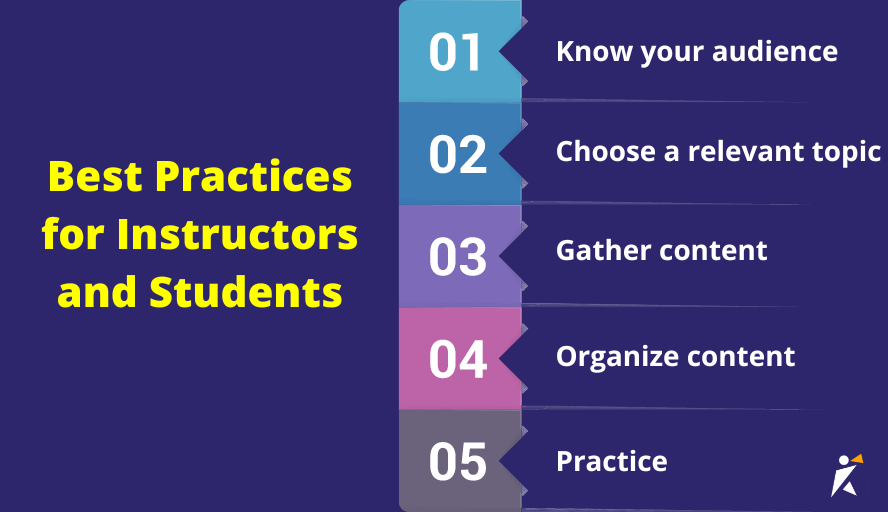Using Psychology to Improve Public Speaking: Best Practices for Instructors and Students

Modern society thrives because of communication. Without it, we wouldn’t have the power to build connections, or to influence change or the decision-making process. Our ability to thrive in the world would be almost impossible. Public speaking is among the most essential forms of communication. At the same time, most people see it as a terrifying experience. Speech anxiety is a common fear that people have today.
If you find the intersection of psychology and public speaking fascinating and wish to delve deeper into the discipline, consider enrolling in a graduate diploma program at UTS Online. Here, you can learn and understand the psychological principles that you can apply to become an effective public speaker.
In college, it’s easy for students to sit at the back and avoid raising their hands, however, in the professional world, individuals cannot dodge public speaking. You’ll have to be good at it to make progress on your career path. You should also learn to use psychology in public speaking. In this article, we are going to discuss some of the best practices that both students and instructors can use to become great public speakers.
The importance of knowledge of psychology for public speakers
Every public speaker will benefit from these psychological insights regardless of their skill levels:
1. People follow leaders
As the speaker, you have been given authority. Your audience expects you to lead. Therefore, you need to do everything in your power to avoid losing their allegiance. You need to lead from the moment you begin. To lead from the front, you have to be knowledgeable about the subject at hand. You can get knowledgeable by reading books and reading essays at Eduzaurus. For instance if you’ve always wanted to become a psychologist or want to inspire others to study psychology, you can enter– ‘why I want to study psychology essay’ into your search bar and get instant results on the platform. When you feel anxious or fearful because you don’t have the required knowledge, your audience might start doubting you. You can avoid this situation through practice and preparation.
2. Audiences read people
Your audience will size you up to some extent even before you utter your first word. This means that you have to plan your opening carefully. Crafting your intro well and using confident body language will inspire your listeners to follow through. Various psychological studies have shown that it only takes a second for the average human being to make an unconscious decision about others.
3. Body movement is essential
You have to know how to stand, gesture, move and deal with anxiety for your speech to have an impact on your audience. You need to stand confidently and record yourself while rehearsing to discover what you need to work on. If you aren’t feeling confident, you are probably lacking practice. It is essential to assume confident postures onstage.
4. Emotions are contagious
As a public speaker, you should keep in mind that emotions are contagious. This especially applies to nervousness and passion. Think of the emotions that you’d want your audience to feel and then feel the emotions. Your voice and body language will convey these emotions. Remember that the neurons in our brains allow us to feel what others are feeling through empathy.
5. People think about themselves most of the time
Anxious speakers usually think that their audience will be listening to every word they utter and scrutinizing every gesture they make. However, this is not the case. Most of the listeners will be thinking about themselves and their problems. You need to figure out the one thing that you want your audience to take home after you’ve interacted with them. You should do this before you start structuring the speech. The key message will determine the route that you’ll take.
6. Your tone determines the experience of your audience
Your tone reflects your psychological mood and emotion. It carries social information. Therefore, you should always strive to strike a balance between sincerity and humor while speaking in front of your audience. Humor is not just about jokes, nor is sincerity just about pouring out your emotions. You have to figure out how your audience will receive and remember the key message.
7. Speech length and clarity go hand-in-hand
How much time will you be given to deliver your speech? You need to keep this in mind as you prepare it. There shouldn’t be a massive difference between the time you’ve been allocated and how long you speak. Plus, in the modern world, everyone is in a rush. If you speak for more than ten minutes without being concise, your audience will get bored.

Best Practices for Instructors and Students
Here are some effective tips that you should use when preparing a speech:
1. Know your audience
The most important part of public speaking is knowing your audience. Remember, you are not preparing your speech for yourself, but for your audience. Therefore, you have to know their characteristics and what they want to learn from you. Other factors that you should consider include age, educational level, and economic status.
2. Choose a relevant topic
The choice of your topic will be determined by your audience and the occasion. When choosing a topic, ensure that you go for one that interests you. Working on a topic that doesn’t interest you will feel like a burden. And you’ll end up performing average or poorly. If you don’t show enthusiasm, your audience will not be interested.
3. Gather content
After choosing the appropriate topic, you need to research extensively to gather information. You have to know more than your audience for them to be interested. Read books, research papers, essays and watch interviews on the topic.
4. Organize content
You have to organize the information that you’ve gathered to deliver a meaningful speech. Remember, your audience is looking up to you. If you are not organized, they will not pay attention. And you’ll fail to deliver your key message.
5. Practice
To overcome feelings of anxiety and fear, you have to practice your speech or presentation. As you practice, focus on key elements such as body language, tone, and speaking rate. You also need to maintain eye contact. Avoid slouching or making sudden movements as you speak.
Conclusion
Public speaking is a skill. To get better at it, you have to learn from your mistakes and practice regularly. As the popular saying goes, practice makes perfect. Learning from other great speakers in your local area will go a long way in helping you achieve your goals. These are some of the best tips for speakers.





